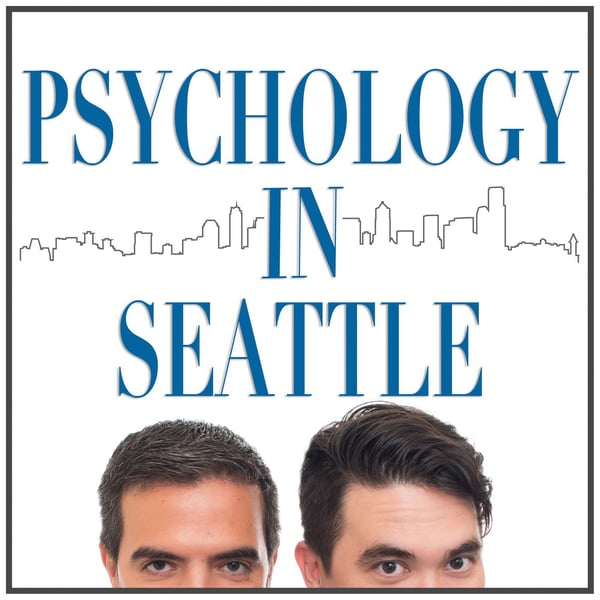Attachment Theory Emails (Part 1) (2020 Rerun)
Psychology In Seattle Podcast
Kirk Honda
4.6 • 1.2K Ratings
🗓️ 3 April 2021
⏱️ 82 minutes
🧾️ Download transcript
Summary
Become a patron: https://www.patreon.com/PsychologyInSeattle
Get merch: https://teespring.com/stores/psychology-in-seattle
Email: https://www.psychologyinseattle.com/contact
The Psychology In Seattle Podcast ®
Disclaimer: The content provided is for educational, informational, and entertainment purposes only. Nothing here constitutes personal or professional consultation, therapy, diagnosis, or creates a counselor-client relationship. Topics discussed may generate differing points of view. If you participate (by being a guest, submitting a question, or commenting) you must do so with the knowledge that we cannot control reactions or responses from others, which may not agree with you or feel unfair. Your participation on this site is at your own risk, accepting full responsibility for any liability or harm that may result. Anything you write here may be used for discussion or endorsement of the podcast. Opinions and views expressed by the host and guest hosts are personal views. Although, we take precautions and fact check, they should not be considered facts and the opinions may change. Opinions posted by participants (such as comments) are not those of the hosts. Readers should not rely on any information found here and should perform due diligence before taking any action. For a more extensive description of factors for you to consider, please see www.psychologyinseattle.com
This show is part of the Spreaker Prime Network, if you are interested in advertising on this podcast, contact us at https://www.spreaker.com/show/3269717/advertisement
Transcript
Click on a timestamp to play from that location
| 0:00.0 | Hey, deserving listeners. I compiled a bunch of emails from y'all about attachment theory, |
| 0:04.9 | so I thought I'd get all those out of the way. Let's answer your patron emails about attachment |
| 0:10.7 | theory. This first email is from anonymous patron, they write, |
| 0:14.8 | is it possible to develop an insecure attachment as an adult? When I was 24, I had a very traumatic |
| 0:22.3 | breakup. I'm 30 now and I've been able to hold down along and I haven't been able to hold down |
| 0:28.0 | along term relationships since that breakup at the age of 24. After breaking up, I now relate |
| 0:33.2 | strongly to the avoidant attachment you described in your deep dive end of email. Yeah, so anonymous |
| 0:40.2 | patron here is saying that prior to being 24, she might have been secure or at least mostly secure. |
| 0:49.0 | She had a traumatic breakup when she was 24 and for the past six years, she would describe herself as |
| 0:55.1 | being avoidant attachment. Often when I talk about attachment theory and the way it's often |
| 1:02.8 | discussed in the literature is that we develop our attachment theory in response to our |
| 1:08.9 | relational environment when we're very young, 1, 2, 3, 4, 5 years old, and that that |
| 1:15.4 | attachment style will persist into adulthood. Research shows that there is a correlation, |
| 1:23.1 | but it's not a guarantee for sure and research shows that later events can change one's |
| 1:29.2 | attachment style, good and bad. So for example, in therapy, hopefully you are experiencing a secure |
| 1:36.8 | attachment and will thus change your attachment style from being insecure to more secure. So you |
| 1:44.2 | can become more healthy attachment wise when you experience healthy attachments. Also, which |
| 1:50.9 | stands to reason, if you experience damaging attachment experiences, then your attachment style |
| 1:57.6 | will move more towards insecure away from secure. So attachment style does more full of time, |
| 2:06.3 | absolutely. And it's also dependent on your partner. If your partner is more undifferentiated, |
| 2:13.8 | more insecure, then in all likelihood, you're going to move more towards attachment insecurity. |
| 2:20.3 | You might have notices about yourself. If you've had enough partners in your life, you might |
... |
Please login to see the full transcript.
Disclaimer: The podcast and artwork embedded on this page are from Kirk Honda, and are the property of its owner and not affiliated with or endorsed by Tapesearch.
Generated transcripts are the property of Kirk Honda and are distributed freely under the Fair Use doctrine. Transcripts generated by Tapesearch are not guaranteed to be accurate.
Copyright © Tapesearch 2025.

